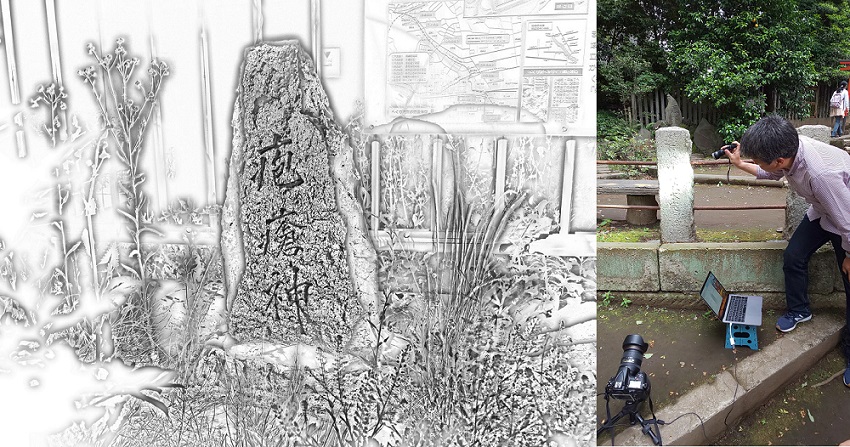2021.3.19
Starting Diverse Research and Practical Activities Related to Infectious Diseases

Making a copy of a stone monument (Photo provided by Japanese Disaster Culture Lab).
In order to prevent the spread of COVID-19, IRIDeS cancelled or postponed several events that had been planned for the 10th anniversary of the Great East Japan Earthquake. Field research activities of IRIDeS faculty members have also been severely restricted. On the other hand, IRIDeS members including executive committee members and disaster medicine experts held regular meetings to address infectious disease countermeasures in the research and education environment, while developing online systems of meetings, research activities, and public events.
In addition, researchers with diverse specialities have launched 10 research projects in 2020, seeing infectious diseases as another kind of disaster and utilizing the lessons from the 2011 catastrophe. The themes of the projects include “Historical Changes in the Socio-Cultural Context of Infectious Diseases (Repel Epidemic Project),” “Improvement of Business Continuity Plans for Companies and Organizations Responding to COVID-19,” “Visualization and Reduction Measures of COVID-19 Transmission Risk during Flooding under Infectious Disease Epidemics,” and “The Power to Live with COVID-19.” All of them are characterized by their interdisciplinary nature.
The Repel Epidemic Project1) conducts research on infectious disease-related stone monuments and traditional customs in order to repel epidemics in various places of the region. The project proceeded in cooperation with the Sendai City Museum of History and Folklore and the citizens. On September 30, 2020, Assoc. Prof. Yuichi Ebina, the project leader, held a press conference in Sendai City to call for cooperation from the public.
In November 2020, Dr. Yasuhiro Miki and his research team members published a paper revealing that behavioral regulations as a countermeasure against COVID-19 have caused motivation loss and anxiety about the future for researchers2). In December of the same year, researcher Masashi Sakamoto and his research team members published a review paper to verify evacuation procedures in the event of a disaster caused by natural hazards under pandemic conditions3).
On August 31, 2020 in Kawasaki City, Professor Fumihiko Imamura conducted a demonstration experiment, together with the Earthquake Research Institute of the University of Tokyo, Fujitsu Limited, and the City of Kawasaki, to run an evacuation center assuming that a natural hazard disaster occurred during COVID-19. The experiment was a practical activity of industry-academia collaboration to reduce the infection risk in an evacuation center, and to ensure a safer evacuation by using human flow simulation technology and AI image analysis solutions.
Since its establishment, IRIDeS has promoted research and practical activities with the mission to “turn misfortune of the Great East Japan Earthquake into construction of a safer society,” while keeping a Japanese saying in mind that states, “Turn disaster into fortune.” Now, 10 years after the occurrence of the disaster, IRIDeS has added a new goal to its mission, taking advantage of lessons learned from the Great East Japan Earthquake: “Turn the pandemic into building a better society.”
1) Repel Epidemic Project website: https://www.saigaibunka.jp/index.html (in Japanese).
2) Miki Y, Chubachi N, Imamura F, Yaegashi N & Ito K.(2020) Impact of COVID-19 restrictions on the research environment and motivation of researchers in Japan. Progress in Disaster Science 8.
3) Sakamoto M, Sasaki D, Ono Y, Makino Y. & Kodama E. (2020) Implementation of evacuation measures during natural disasters under conditions of the novel coronavirus(COVID-19) pandemic based on a review of previous responses to complex disasters in Japan. Progress in Disaster Science 8.
For inquiries, please contact IRIDeS PR Office at +81-22-752-2049 or email: @
